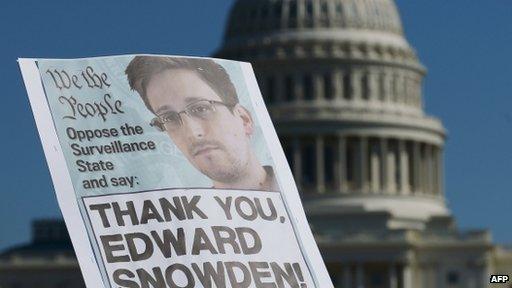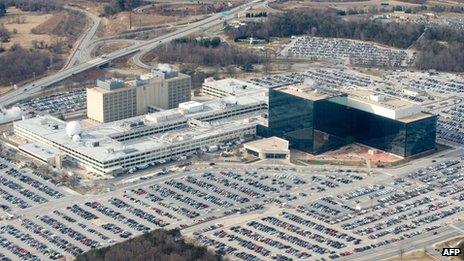Edward Snowden leaks: NSA 'debates' amnesty
- Published
- comments

Whistleblower or traitor? Edward Snowden's leaks have divided the US
A top NSA official has raised the possibility of an amnesty for fugitive intelligence contractor Edward Snowden if he agrees to stop leaking documents.
The man in charge of assessing the leaks' damage, Richard Ledgett, said he could be open to an amnesty deal.
Disclosures by the former intelligence worker have revealed the extent of the NSA's spying activity.
But NSA Director Gen Keith Alexander has dismissed the idea.
Mr Ledgett spoke to US television channel CBS about the possibility of an amnesty deal: "So my personal view is, yes it's worth having a conversation about.
"I would need assurances that the remainder of the data could be secured, and my bar for those assurances would be very high, would be more than just an assertion on his part."
But Gen Alexander, who is retiring early next year, rejected the idea of any amnesty for Mr Snowden.
"This is analogous to a hostage taker taking 50 people hostage, shooting 10, and then say, 'if you give me full amnesty, I'll let the other 40 go'. What do you do?"
In an earlier interview with the Reuters news agency, Mr Ledgett said he was deeply worried about highly classified documents not yet public that are among the 1.7 million files Mr Snowden is believed to have accessed.
Mr Snowden's disclosures have been "cataclysmic" for the agency, Mr Ledgett told Reuters.
Earlier this month, a UK newspaper editor told UK MPs only 1% of files leaked by Mr Snowden had been published by the newspaper.
The state department says its position has not changed and that Mr Snowden must return to the US to face charges, says the BBC's Suzanne Kianpour.
The US has charged Mr Snowden with theft of government property, unauthorised communication of national defence information and wilful communication of classified communications intelligence.
Each of the charges carries a maximum 10-year prison sentence.
At the weekend, the NSA allowed a CBS television crew into their headquarters for the first time in its history, in an effort to be more open about what the agency does with the data it collects.

The NSA has been making efforts to be seen as more transparent
- Published16 December 2013
- Published11 December 2013
- Published9 December 2013
- Published5 December 2013
- Published3 December 2013
- Published27 November 2013